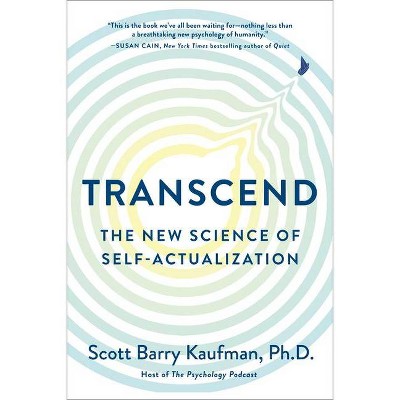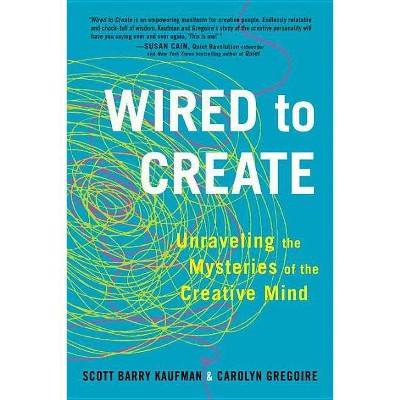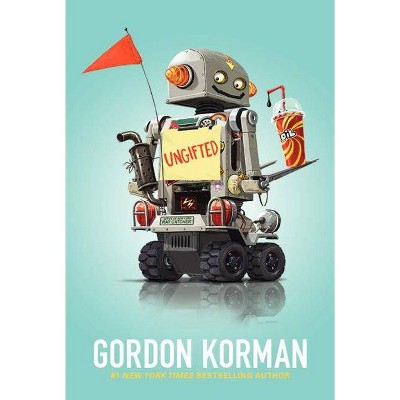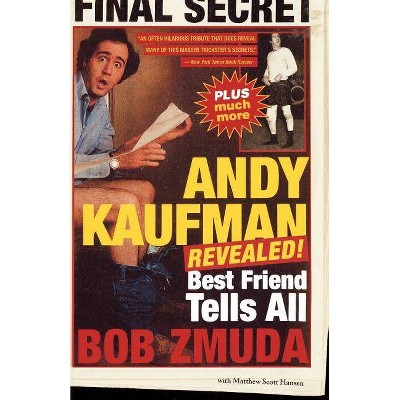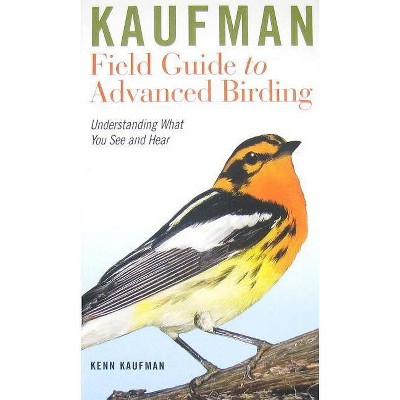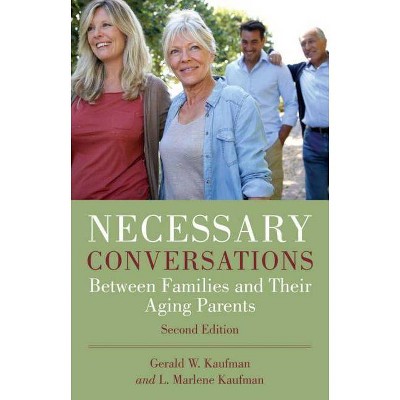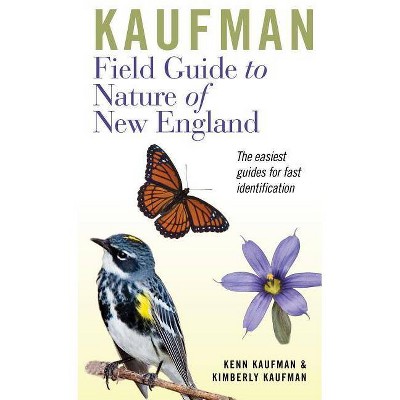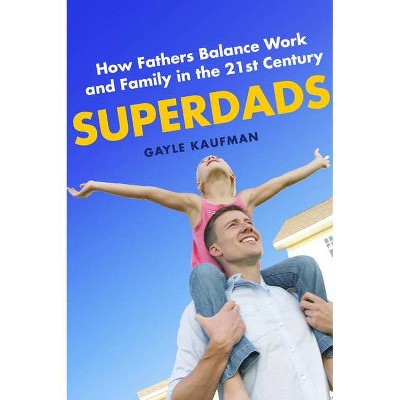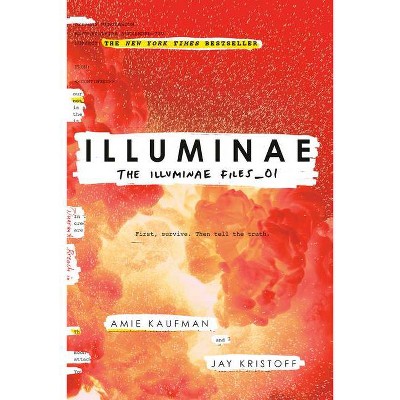Ungifted - by Scott Barry Kaufman (Paperback)
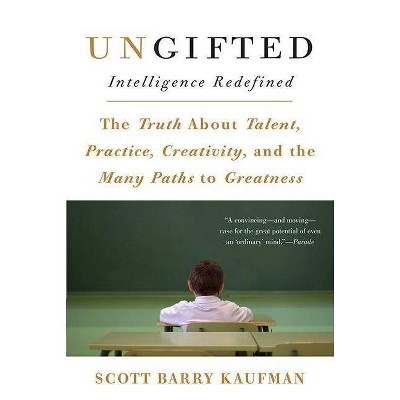
Similar Products
Products of same category from the store
AllProduct info
<p/><br></br><p><b> Book Synopsis </b></p></br></br>Child prodigies. Gifted and Talented Programs. Perfect 2400s on the SAT. Sometimes it feels like the world is conspiring to make the rest of us feel inadequate. Those children tapped as possessing special abilities will go on to achieve great things, while the rest of us have little chance of realizing our dreams. Right? <p/> In <i>Ungifted</i>, cognitive psychologist Scott Barry Kaufman -- who was relegated to special education as a child -- sets out to show that the way we interpret traditional metrics of intelligence is misguided. Kaufman explores the latest research in genetics and neuroscience, as well as evolutionary, developmental, social, positive, and cognitive psychology, to challenge the conventional wisdom about the childhood predictors of adult success. He reveals that there are many paths to greatness, and argues for a more holistic approach to achievement that takes into account each young person's personal goals, individual psychology, and developmental trajectory. In so doing, he increases our appreciation for the intelligence and diverse strengths of prodigies, savants, and late bloomers, as well as those with dyslexia, autism, schizophrenia, and ADHD. <p/> Combining original research, anecdotes, and a singular compassion, <i>Ungifted</i> proves that anyone -- even those without readily observable gifts at any single moment in time -- can become great.<p/><br></br><p><b> Review Quotes </b></p></br></br><br><i>Ungifted</i> insightfully interweaves a personal story with scientific research to prove that many of us have special gifts that can lead to greatness. Scott Barry Kaufman shows that we just cannot let others tell us what those gifts are.--<i><b>Dean Keith Simonton, distinguished professor of psychology, University of California, Davis, and author of Origins of Genius</b></i><br><br><i>Ungifted</i> provides a wealth of information about unlocking the potential of those at all levels of the IQ and personality scales. It is interwoven with the author's early life history, which was a tragedy of misdiagnosis.--<i><b>James R. Flynn, emeritus professor of politics, University of Otago, and author of What is Intelligence?</b></i><br><br>A convincing--and moving--case for the great potential of even an 'ordinary' mind.--<i><b>Parade</b></i><br><br>A good read...introduces the reader to the world of intelligence testing in a highly literate style and pulls back the curtain on some very bad practices in public schools.... Kaufman makes a strong case that anyone can be great, even the 'ungifted.'--<i><b>Post and Courier</b></i><br><br>A moving personal story of overcoming the effects of having been labeled as learning disabled, and at the same time a wide ranging exploration of a set of fascinating topics related to ability, learning, and achievement. An inspiring account that should both educate and give hope to children, teachers, and parents.--<i><b>Ellen Winner, professor of psychology, Boston College, and author of Gifted Children: Myths and Realities</b></i><br><br>A warmly human and coolly scientific survey of both the reductive and the liberating fruits of two centuries of cognitive research.--<i><b>The Scientist</b></i><br><br>Fascinating.... A smart, lucid, and down-to-earth exposition of the underlying neuroscience and the contentious history of theories of intelligence.... Blending incisive analysis with a warm sympathy for intellectual insecurities--and potential--Kaufman demonstrates that even the most ordinary mind is a strange and wondrous gift.--<i><b>Publishers Weekly</b></i><br><br>Kaufman makes a convincing case for incorporating valuable but less easily measured attributes into our view of intelligence.... Most powerfully, Kaufman illustrates the importance of uncovering what gives each person his or her own brand of intelligence, taking into account individual goals, psychologies and brain chemistry.--<i><b>Scientific American Mind</b></i><br><br>Kaufman makes a convincing case that stereotyping students is not only unsupported by research, but also discriminatory.... An inspiring, informative affirmation of human potential combined with an overview of historical developments in standardized tests, cognitive psychology and current research.--<i><b>Kirkus Reviews</b></i><br><br>Kaufman presents a convincing 'theory of personal intelligence.' But what emerges most clearly is how all children--gifted, disabled or simply humming with untapped abilities--need a fine-tuned, holistic education to shine in their own extraordinary ways.--<i><b>Nature</b></i><br><br>Kaufman's portrait of the history of intelligence provides a background on experiments in cognitive psychology, biographical information about influential researchers, and details of his own experience in the special education classroom, making this academic work also personal. Highly recommended for readers curious about human intelligence. --<i><b>Library Journal, starred review</b></i><br><p/><br></br><p><b> About the Author </b></p></br></br><b>Scott Barry Kaufman</b> is Scientific Director of the Imagination Institute in the Positive Psychology Center at the University of Pennsylvania. He completed his doctorate at Yale, his M. Phil. at the University of Cambridge under a Gates Cambridge Scholarship, and his undergraduate degree at Carnegie Mellon University. He is cofounder of <i>The Creativity Post</i>, and writes the blog <i>Beautiful Minds</i> for <i>Scientific American</i>. Kaufman lives in Philadelphia, Pennsylvania.
Price History
Cheapest price in the interval: 18.29 on October 22, 2021
Most expensive price in the interval: 18.29 on December 20, 2021
Price Archive shows prices from various stores, lets you see history and find the cheapest. There is no actual sale on the website. For all support, inquiry and suggestion messagescommunication@pricearchive.us
